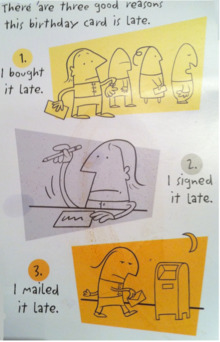Epistrophe (Greek: ἐπιστροφή, "return") is the repetition of the same word or words at the end of successive phrases, clauses or sentences.[1] It is also known as epiphora and occasionally as antistrophe. It is a figure of speech and the counterpart of anaphora. It is an extremely emphatic device because of the emphasis placed on the last word in a phrase or sentence.
Platonic epistrophe
Greek epistrophe: "a word coined by Plato as a goal of philosophical education and the term adopted by early Christians for conversion".[2]
Examples
- "Where affections bear rule, their reason is subdued, honesty is subdued, good will is subdued, and all things else that withstand evil, for ever are subdued." — Thomas Wilson
- "... this nation, under God, shall have a new birth of freedom—and that government of the people, by the people, for the people, shall not perish from the earth." — Abraham Lincoln in the Gettysburg Address
- "When I was a child, I spoke as a child, I understood as a child, I thought as a child; but when I became a man, I put away childish things." — The Apostle Paul, in the Bible, 1 Cor 13:11 (King James Translation)
- "There is no Negro problem. There is no Southern problem. There is no Northern problem. There is only an American problem." Lyndon B. Johnson in "We Shall Overcome"
- "What lies behind us and what lies before us are tiny compared to what lies within us." — Ralph Waldo Emerson
- "Hourly joys be still upon you!
Juno sings her blessings on you. ...
Scarcity and want shall shun you,
Ceres' blessing so is on you."
— Shakespeare, The Tempest (4.1.108-109; 116–17)
See also
- Antimetabole
- Anthimeria
- Figure of speech
- Epistrophy (composition), a jazz standard composed by Thelonious Monk and Kenny Clarke in 1941
References
- ^ George Roberts (schoolmaster.) (1820). A catechism of rhetoric. p. 55. Retrieved 24 September 2013.
- ^ Peters, Gerald (1993). The Mutilating God: Authorship and Authority in the Narrative of Conversion. Amherst, MA: University of Massachusetts Press. p. 3. ISBN 9780870238918.
External links
- Audio illustrations of epistrophe
- The Hermeneutics of the Subject: Lectures at the Collège de France 1981--1982
- Eric J. Ziolkowski. "The Mutilating God: Authorship and Authority in the Narrative of Conversion (review)."Philosophy and Literature 18.2 (1994): 413-415. Project MUSE. Web. 26 Jan. 2013. http://muse.jhu.edu/.
